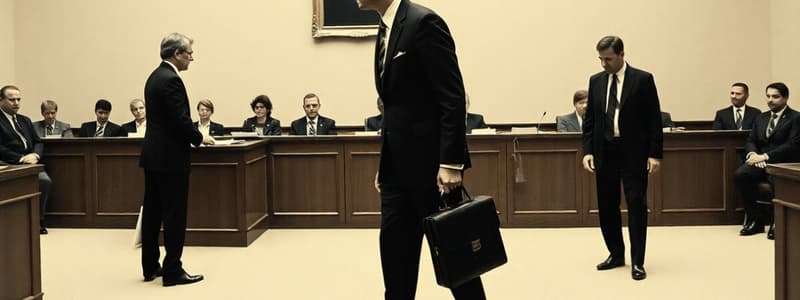Podcast
Questions and Answers
What should an officer do if they do not know the answer to a question on the stand?
What should an officer do if they do not know the answer to a question on the stand?
- Request a recess
- Say 'I don't know' or 'I can't remember' (correct)
- Guess an answer
- Deflect the question
Why is it important for a law enforcement officer to remain calm during testimony?
Why is it important for a law enforcement officer to remain calm during testimony?
- To avoid annoying the jury
- To impress the jury with self-control (correct)
- To fill time during the testimony
- To make the defense attorney angry
What critical aspect is highlighted regarding jurors' expectations of law enforcement officers?
What critical aspect is highlighted regarding jurors' expectations of law enforcement officers?
- Officers must answer questions immediately
- Officers should be more knowledgeable than lay witnesses
- Officers can be less respectful than lay witnesses
- Officers need to show higher standards of professionalism (correct)
What should an officer do if they find a question difficult to understand?
What should an officer do if they find a question difficult to understand?
What is one way an officer can convey competence while testifying?
What is one way an officer can convey competence while testifying?
Which behavior should an officer avoid during their testimony to maintain credibility?
Which behavior should an officer avoid during their testimony to maintain credibility?
What is a recommended practice for an officer when presenting their testimony?
What is a recommended practice for an officer when presenting their testimony?
How should an officer's demeanor affect their interactions with jurors?
How should an officer's demeanor affect their interactions with jurors?
What is the recommended standard for personal appearance when testifying in court?
What is the recommended standard for personal appearance when testifying in court?
Why should an officer avoid bringing distracting items to court?
Why should an officer avoid bringing distracting items to court?
What should officers do if they are provoked by a defense attorney?
What should officers do if they are provoked by a defense attorney?
What is advisable to discuss with the prosecutor before a court appearance?
What is advisable to discuss with the prosecutor before a court appearance?
What is a common trial tactic employed by defense attorneys?
What is a common trial tactic employed by defense attorneys?
What should an officer do if they do not know the answer to a question during testimony?
What should an officer do if they do not know the answer to a question during testimony?
What effect can showing sarcasm in response to a defense attorney's questions have?
What effect can showing sarcasm in response to a defense attorney's questions have?
What should be avoided regarding interactions with defense attorneys in court?
What should be avoided regarding interactions with defense attorneys in court?
Flashcards
Poise and Self-Control
Poise and Self-Control
Maintain composure and self-control while testifying, even when faced with a difficult or aggressive defense attorney.
Defense Attorney Tactics
Defense Attorney Tactics
A defense attorney may use aggression or provocation to elicit a response from the witness.
Avoid Anger and Irritability
Avoid Anger and Irritability
Avoid showing anger or irritation towards the defense attorney, even when they are being challenging.
Argumentative and Sarcastic Attorneys
Argumentative and Sarcastic Attorneys
Signup and view all the flashcards
Being Honest and Clear
Being Honest and Clear
Signup and view all the flashcards
Don't Exaggerate or Be Unsure
Don't Exaggerate or Be Unsure
Signup and view all the flashcards
Admitting Ignorance
Admitting Ignorance
Signup and view all the flashcards
Professional Appearance
Professional Appearance
Signup and view all the flashcards
It's Okay to Say 'I Don't Know'
It's Okay to Say 'I Don't Know'
Signup and view all the flashcards
Importance of Composure
Importance of Composure
Signup and view all the flashcards
Losing Your Cool Damages Credibility
Losing Your Cool Damages Credibility
Signup and view all the flashcards
Higher Expectations for Law Enforcement
Higher Expectations for Law Enforcement
Signup and view all the flashcards
Prosecutors May Not Intervene As Frequently
Prosecutors May Not Intervene As Frequently
Signup and view all the flashcards
Delivering Clear and Concise Responses
Delivering Clear and Concise Responses
Signup and view all the flashcards
Active Listening
Active Listening
Signup and view all the flashcards
Displaying Appropriate Verbal and Nonverbal Skills
Displaying Appropriate Verbal and Nonverbal Skills
Signup and view all the flashcards
Study Notes
Professional Courtroom Appearance
- Dress professionally: Dress as you would for a significant job interview, meticulously neat with pressed clothes, shined shoes, and clean fingernails. Trimmed hair is also essential.
- Minimize distractions: Carry only necessary items. Avoid anything that clatters, shines, or flashes, to prevent distracting jurors.
- Uniform vs. civilian attire: Follow departmental rules concerning uniform versus civilian attire. Officers may be armed regardless of clothing choice in some jurisdictions—excluding federal courts. Consider the potential distraction of armed, civilian-dressed officers, and discuss carrying items with the prosecutor beforehand.
Maintaining Professional Attitude on the Stand
- Control your emotions: Avoid anger or sarcasm, even when facing difficult questions or tactics from defense attorneys. Recognizing that some attorneys use anger-baiting tactics is crucial.
- Resist the urge to react: Stay composed and avoid reacting emotionally to provocative questions; this gives the defense an advantage. Think clearly and avoid emotional responses.
- Answer honestly, not aggressively: If you don't know the answer, say so clearly; phrases like "I don't know," or "I can't remember" are perfectly acceptable. Resist the misconception that officers must know every answer.
- Manage interruptions and attacks: Remain calm and respectful throughout the entire testimony. Maintain your composure amidst interruptions, delays, argumentative questioning, and character attacks. Do not get flustered, arrogant or aggressive.
- Recognize the heightened expectation: Jurors hold law enforcement officers to a higher standard than other witnesses. Expect more challenging questions, and recognize that the prosecutor might not immediately object to defense attempts at aggressive questioning.
Effective Testimony Strategies
- Maintain calmness and respect: Remaining calm and respectful is vital for credibility. Losing control damages your credibility with the jury.
- Speak clearly and concisely: Speak clearly, slowly, and concisely. Maintain a calm and confident tone. Ensure your speech projects competence, clarity and sincerity.
- Active listening: Listen carefully to each question before responding.
- Seek clarification: If you don't understand a question, ask the attorney to rephrase it.
- Professional demeanor: Maintain dignity, decorum, and openness throughout the testimony; be friendly and professional at all times.
Studying That Suits You
Use AI to generate personalized quizzes and flashcards to suit your learning preferences.




